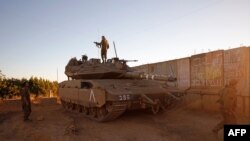Rockets were fired from Lebanon towards Israel on Wednesday, prompting Israel to launch artillery strikes at targets in Lebanon.
It was the third time rockets had been fired from Lebanon toward Israel since clashes between Israel and Palestinians militants erupted earlier this month. However, experts do not expect Hezbollah, the militant group that dominates power in Lebanon, to take actions to further increase regional tensions.
Israeli officials have indicated they believe a small Palestinian faction was behind the rocket barrages from Lebanon and not Hezbollah, which has access to advanced rockets.
“It is highly unlikely (albeit never impossible) that tensions at the Lebanese-Israeli borders will escalate enough to warrant or cause direct confrontations between Hezbollah and the Israeli Defense Forces,” Christophe Abi-Nassif, the director of the Lebanon Program at the Middle East Institute (MEI), told VOA.
He added that Hezbollah has adopted a self-restrained approach currently given that it has a lot to lose at home.
“Not only does the party have nothing to prove at this stage, but its political calculus and alliances at home as well as Lebanon's dire economic situation make an open conflict with Israel very costly. Even absent a potential conflict, Hezbollah has more internal stakeholder management to do in Lebanon today than at any point in recent years,” said Abi-Nassif.
Israel and Hezbollah fought a 34-day war in 2006, leaving more some 1,200 Lebanese dead.
Mohanad Hage Ali, the director of communications and fellow at the Malcom H. Kerr Carnegie Middle East Center, told VOA Hezbollah’s involvement in the current conflict depends on how long it lasts as the organization cannot “watch indefinitely” as Israeli occupation forces respond disproportionately against Gaza.”
Political figures within the country have also come out against dragging the country into a regional conflict as the country continues to face a large-scale economic crisis.
According to Arab News, lawmaker and scholar Bilal Abdallah said that “Lebanon is facing an economic collapse and a vacuum in its political power, and the Palestine issue should not be put at the forefront.”
Hassan Fakih, vice president of the General Confederation of Lebanese Workers, a major national trade union, has warned against “taking the country into total chaos that will wipe out what is left of Lebanon.”
According to Arab News, Fakih said “matters in Lebanon have reached an unbearable level, as the economic situation has become a real threat to all classes of people.”
He added that people in the country “have crossed the poverty threshold as a result of the policies adopted by the political system that has been running the country for many years.”
The Lebanese economy has been attempting to recover following the devastating ongoing COVID-19 pandemic and the blast at the Beirut port last August that killed over 200 and injured more than 6,000.
Since fall 2019, multiple waves of nationwide demonstrations have pushed to topple a political elite that has run the country since a civil war ended in 1990.




